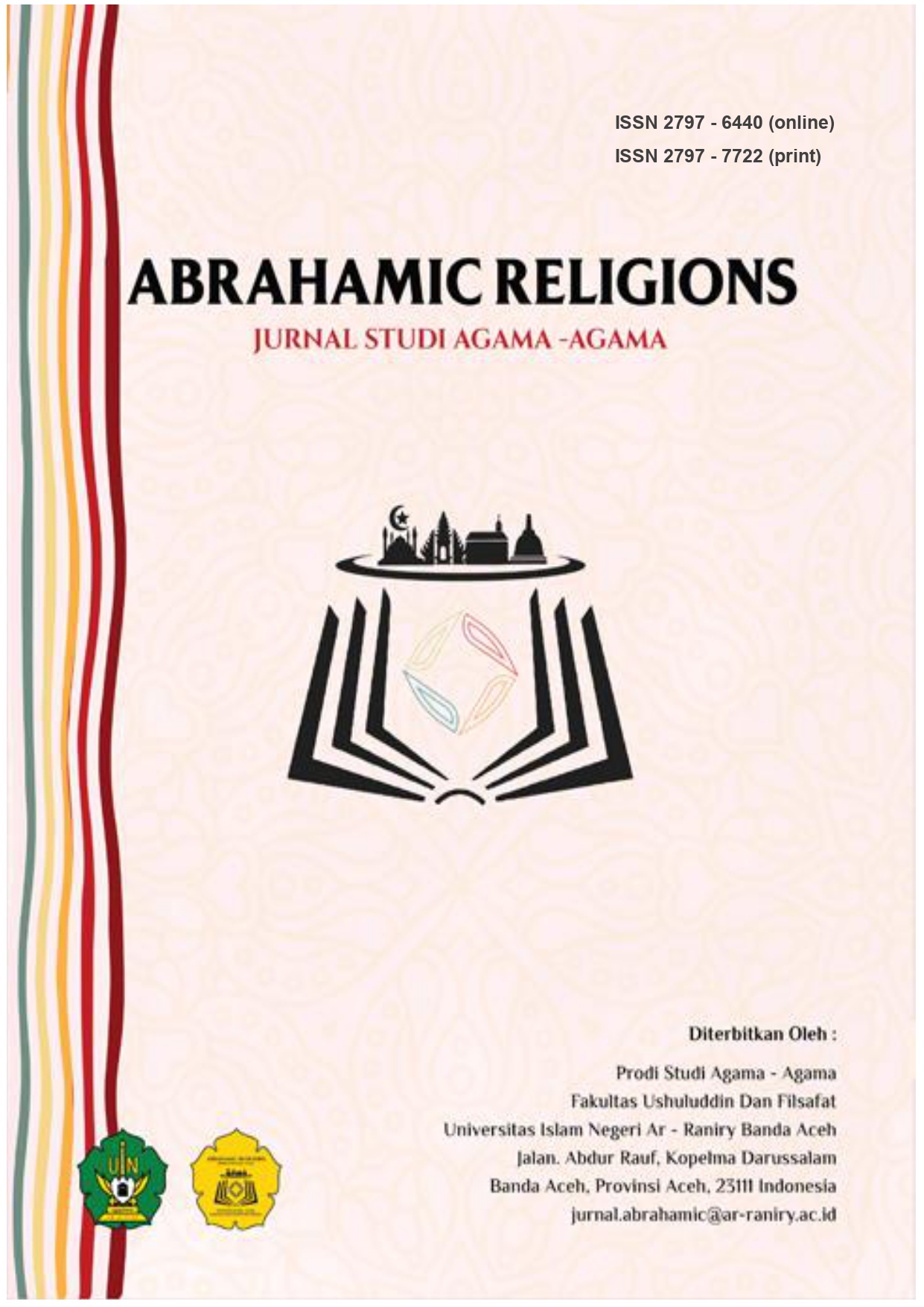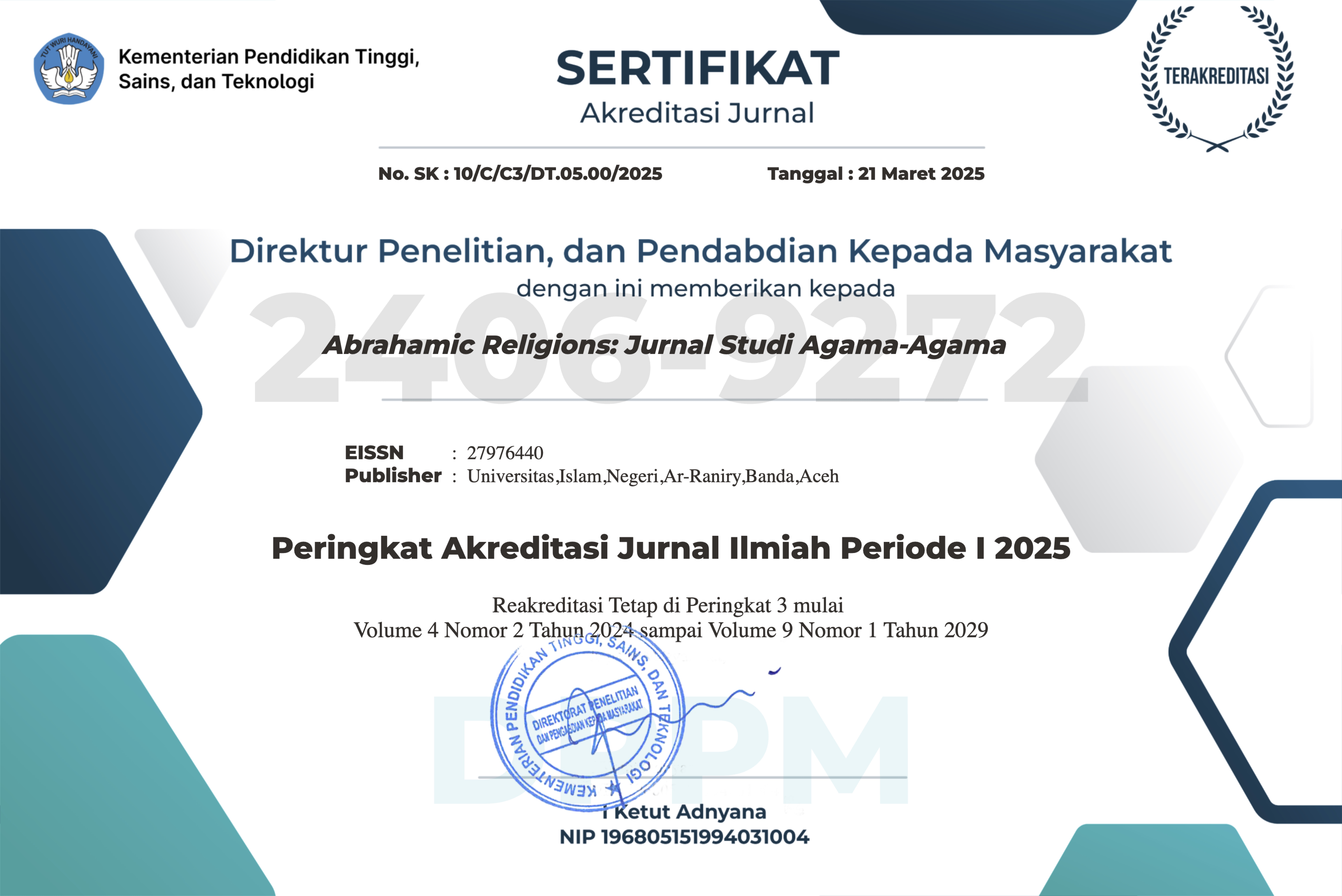KONSEP TUHAN DALAM AGAMA KRISTEN (KAJIAN BUKU SEJARAH TUHAN KAREN ARMSTRONG)
DOI:
https://doi.org/10.22373/arj.v1i1.9487Keywords:
Tuhan, Trinitas, Agama Kristen, Karen ArmstrongAbstract
Talking about God has always been a topic of conversation among theologians. Karen Armstrong as a theologian tries to explain the existence of God. Her book entitled The History of God, Karen Armstrong describes in detail the existence of God in the history of human life. The book tells about Karen Armstrong's hesitation in finding the essence of the Trinity in the concept of Christian divinity. Karen Armstrong went through several phases in her skepticism to reach the essence of God in her faith. This paper will discuss Karen Armstrong's view of the Concept of God in Christian Religion using descriptive analysis of the book History of God. The results of the study show that in Christianity the concept of divinity exists in the Trinity, namely God the Father, God the Son and the Holy Spirit. Where Jesus Christ is considered as God because it is believed that Jesus is the Word who became human. The strengths and weaknesses of the Trinity in Christianity that are not understood by everyone. The history book about God examines the history of human perceptions and experiences of God from the time of Prophet Abraham to the present. Karen Armstrong explains in detail the three monotheistic religions, namely Judaism, Christianity and Islam. The book also features Buddhist, Hindu and Confucian traditions. For Karen Armstrong Religion is not about believing in something. Religion is a matter of morals, behaving in ways that change oneself, bringing oneself closer to the holy and sacred.References
Armstrong, Karen. (2011). A History Of God: 4000 Tahun Pengembaraan Manusia Menuju Tuhan), Terjemahan, M, Sadad Ismail. Jakarta : Nizam Press.
---------------------------. (2001). Sejarah Tuhan, terj. Zainul Am. Bandung: Mizan
---------------------------. (2011). Masa Depan Tuhan Sanggahan Terhadap- Fundamentalisme dan Ateisme. Bandung: Mizan. Terjemahan Yuliani Liputo.
---------------------------. (2012). Compassion: 12 Langkah Menuju Hidup Berbelas kasih, Bandung: Mizan. Terjemahan Yuliani Liputo.
Madkour, Ibrahim. (1993). Filsafat Islam: Metode dan Penerapannya. Jakarta: Raja Grafindo Persada.
Nasution, Harun. (1986). Teologi Islam: Aliran-Aliran Sejarah Analisa Perbandingan. Jakarta: UI-Press.
Tim Penyusun Kamus Pusat Pembinaan Pengembangan Bahasa Depdikbud. (1993). Kamus Besar Bahasa Indonesia. Jakarta: Balai Pustaka.
Berperang Demi Tuhan Fundamentalism, http://www.mizan.com/buku_full/berperang-demi-tuhan-hard-cover.html, Diakses pada tanggal 2 Februari 2013.
Dwiki Setiyawan’s blog, Sejenak Mengenal Pengarang Religi Kenangan Karen Armstrong, Diakses pada tanggal 2 Februari 2013.
http://indrayogi.multiply.com/reviews/item/Diakses pada tanggal 15 tgl 20-11-12
Menerobos Kegelapan. http://www.mizan.com/buku_full/menerobos-kegelapan-sebuah-autobiografi-spiritual.html, Diakses pada tanggal 2 Februari 2013.
The Great Tranformation Awal Sejarah Tuhan.http://www.mizan.com/buku_full/the-great-transformation-awal-sejarah-tuhan.html,Diaksespada tanggal 2 Februari 2013.
Downloads
Published
Issue
Section
License
Authors who publish in this Journal agree to the following terms:
- Authors retain copyright and grant the journal right of first publication with the work simultaneously licensed under Attribution-ShareAlike 4.0 International (CC BY-SA 4.0) allows others to share the work with an acknowledgment of the work's authorship and initial publication in this journal.
- Authors are able to enter into separate, additional contractual arrangements for the non-exclusive distribution of the journal's published version of the work (e.g., post it to an institutional repository or publish it in a book), with an acknowledgment of its initial publication in this journal.
- Authors are permitted and encouraged to post their work online (e.g., in institutional repositories or on their website) prior to and during the submission process, as it can lead to productive exchanges, as well as earlier and greater citation of published work. (See The Effect of Open Acces)















